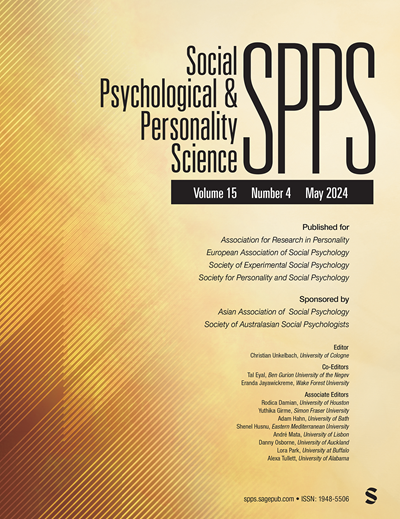抽象允许对他人观点的敏感性:具体思维导致公众自我意识下降的案例
IF 3.3
2区 心理学
Q1 PSYCHOLOGY, SOCIAL
引用次数: 0
摘要
抽象处理信息的能力可以跨越心理距离,扩大一个人的心理视野。因此,抽象思维(相对于具体思维)可能扩大(相对于收缩)一个人的社会范围。因此,假设具体的(相对于抽象的)处理使一个人更少(相对于更多)容易受到他人观点的影响,减弱(相对于增加)公共而不是私人的自我意识。四项研究(总N = 708)验证了这一观点。在一项初步研究中,抽象与公众(但不是私人)自我意识之间存在正相关关系。在研究1a、1b和2中,被操纵的具体思维(相对于抽象思维)会降低公众的自我意识,但不会降低个人的自我意识。研究1b还表明,具体思维降低了公众的自我意识,而不是抽象思维提高了公众的自我意识。研究2还考察了抽象对社交焦虑和尴尬的影响。结果表明,具体(相对抽象)思维通过公众自我意识间接减少了社交焦虑和尴尬。讨论了研究结果的含义。本文章由计算机程序翻译,如有差异,请以英文原文为准。
Abstraction Allows Susceptibility to the Perspective of Others: The Case of Decreased Public Self-Awareness Due to Concrete Thinking
The ability to process information abstractly functions to traverse psychological distance and expand one’s mental horizons. Therefore, abstract (vs. concrete) thinking may expand (vs. contract) one’s social scope. Accordingly, it was hypothesized that concrete (vs. abstract) processing makes one less (vs. more) susceptible to the perspective of others, attenuating (vs. increasing) public—but not private—self-awareness. Four studies (total N = 708) tested this idea. In a pilot study, a positive correlation between abstraction and public (but not private) self-awareness was found. In Studies 1a, 1b, and 2, manipulated concrete (vs. abstract) thinking reduced public self-awareness but not private self-awareness. Study 1b additionally indicated that public self-awareness was reduced by concrete thinking rather than increased by abstract thinking. Study 2 also investigated the effect of abstraction on social anxiety and embarrassment. It was demonstrated that concrete (relative abstract) thinking indirectly reduced social anxiety and embarrassment via public self-awareness. Implications of the findings are discussed.
求助全文
通过发布文献求助,成功后即可免费获取论文全文。
去求助
来源期刊

Social Psychological and Personality Science
PSYCHOLOGY, SOCIAL-
CiteScore
12.50
自引率
1.80%
发文量
77
期刊介绍:
Social Psychological and Personality Science (SPPS) is a distinctive journal in the fields of social and personality psychology that focuses on publishing brief empirical study reports, typically limited to 5000 words. The journal's mission is to disseminate research that significantly contributes to the advancement of social psychological and personality science. It welcomes submissions that introduce new theories, present empirical data, propose innovative methods, or offer a combination of these elements. SPPS also places a high value on replication studies, giving them serious consideration regardless of whether they confirm or challenge the original findings, with a particular emphasis on replications of studies initially published in SPPS. The journal is committed to a rapid review and publication process, ensuring that research can swiftly enter the scientific discourse and become an integral part of ongoing academic conversations.
 求助内容:
求助内容: 应助结果提醒方式:
应助结果提醒方式:


